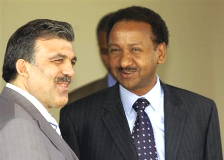Sudanese FM rejects international pressure, foreign troops for Darfur
ANKARA, July 26 (AFP) — Sudanese Foreign Minister Mustafa Osman Ismail said international “threats” would not help solve the conflict in his country’s war-torn Darfur region and urged the European Union to be “balanced” in its statements.
 The minister also said that foreign peacekeepers would not be welcome in the region, where they would risk being seen as occupiers.
The minister also said that foreign peacekeepers would not be welcome in the region, where they would risk being seen as occupiers.
“We don’t need any threats or sanctions,” Ismail told the press after talks here with Turkish counterpart Abdullah Gul.
He was reacting to an EU appeal earlier in the day for the UN Security Council to pass a resolution threatening sanctions on Sudan if it fails to immediately meet pledges to defuse the conflict in Darfur, described by the UN as currently the world’s most serious humanitarian crisis.
“Sometimes threats and pressure towards the government will have negative effects because the rebels, who are still violating the ceasefire, who are reluctant to come to a political dialogue… they will always see this pressure as pressure on the government alone,” Ismail said.
“I urge the EU to be balanced in their statements so that the rebels will not take it by mistake in a different way that they should not be serious with the ceasefire and the political settlement,” he added.
EU foreign ministers, while welcoming a partial improvement in aid access to Darfur, expressed “dissatisfaction” that Khartoum has not yet fulfilled other key obligations such as the disarmement of the pro-government Janjaweed militia.
Ismail argued that his government was sincere in its pledges.
“I think we should be given time and I think we should be supported,” he said.
The minister also expressed opposition to the deployment of foreign troops in his country.
“We don’t need it… What is going to happen is that the people of Darfur after two or three months will look at these forces as occupying forces and then we’re going to enter into the circle which we’re now facing in Iraq and Afghanistan,” Ismail said.
“That’s why we feel that the Sudanese forces should be supported and the Sudanese forces will and can bring the situation into normal,” he added.
Gul, for his part, said Khartoum was expending “great efforts” to end the crisis in Darfur and pledged humanitarian assistance for the region.
The conflict in Darfur began in February 2003 with a rebel uprising against Khartoum, protesting that the largely black African region had been ignored by the Arab government of the oil-rich state.
In response, the pro-government Janjaweed and other militias went on the rampage, carrying out what aid and rights groups have called a systematic campaign of ethnic cleansing.
The conflict has claimed up to 50,000 lives and about 1.2 million have been displaced, with around 200,000 people taking refuge in neighbouring Chad, according to UN officials.
